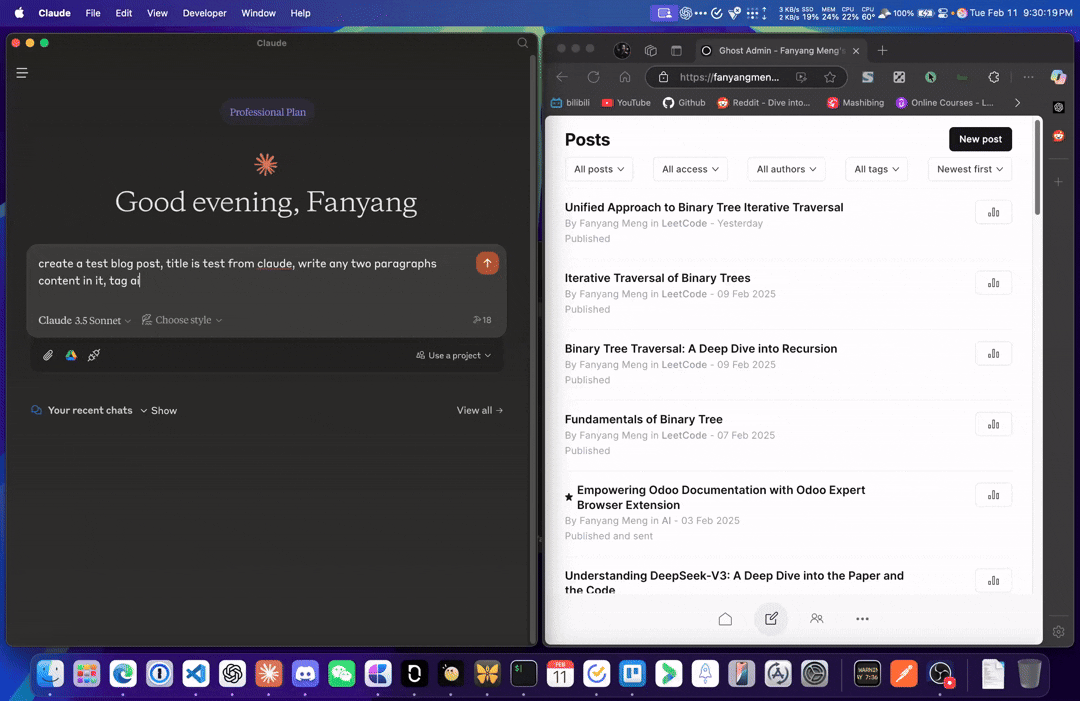Ghost MCP Server
A Model Context Protocol (MCP) server for interacting with Ghost CMS through LLM interfaces like Claude. This server provides secure and comprehensive access to your Ghost blog, leveraging JWT authentication and a rich set of MCP tools for managing posts, users, members, tiers, offers, and newsletters.

Features
- Secure JWT Authentication for Ghost Admin API requests
- Comprehensive entity access including posts, users, members, tiers, offers, and newsletters
- Advanced search functionality with both fuzzy and exact matching options
- Detailed, human-readable output for Ghost entities
- Robust error handling using custom
GhostErrorexceptions - Integrated logging support via MCP context for enhanced troubleshooting
Installation
Installing via Smithery
To install Ghost MCP Server for Claude Desktop automatically via Smithery:
npx -y @smithery/cli install @MFYDev/ghost-mcp --client claude
Manual Installation
# Clone repository
git clone git@github.com/mfydev/ghost-mcp.git
cd ghost-mcp
# Create virtual environment and install
uv venv
source .venv/bin/activate # On Windows: .venv\Scripts\activate
uv pip install -e .
Requirements
- Python ≥ 3.12
- Running Ghost instance with Admin API access (v5.x+ recommended)
- Node.js (for testing with MCP Inspector)
Usage
Environment Variables
GHOST_API_URL=https://yourblog.com # Your Ghost Admin API URL
GHOST_STAFF_API_KEY=your_staff_api_key # Your Ghost Staff API key
Usage with MCP Clients
To use this with MCP clients, for instance, Claude Desktop, add the following to your claude_desktop_config.json:
{
"mcpServers": {
"ghost": {
"command": "/Users/username/.local/bin/uv",
"args": [
"--directory",
"/path/to/ghost-mcp",
"run",
"src/main.py"
],
"env": {
"GHOST_API_URL": "your_ghost_api_url",
"GHOST_STAFF_API_KEY": "your_staff_api_key"
}
}
}
}
Testing with MCP Inspector
GHOST_API_URL=your_ghost_api_url GHOST_STAFF_API_KEY=your_staff_api_key npx @modelcontextprotocol/inspector uv --directory /path/to/ghost-mcp run src/main.py
Available Tools
Ghost MCP now provides a single unified tool that provides access to all Ghost CMS functionality:
Main Tool
ghost: Central tool for accessing all Ghost CMS functionality
Using the Ghost Tool
The ghost tool accepts two main parameters:
action: The specific Ghost operation to performparams: A dictionary of parameters for the specified action
Example usage:
# List posts
ghost(action="list_posts", params={"format": "text", "page": 1, "limit": 15})
# Search posts by title
ghost(action="search_posts_by_title", params={"query": "Welcome", "exact": False})
# Create a post
ghost(action="create_post", params={
"post_data": {
"title": "New Post via MCP",
"status": "draft",
"lexical": "{\"root\":{\"children\":[{\"children\":[{\"detail\":0,\"format\":0,\"mode\":\"normal\",\"style\":\"\",\"text\":\"Hello World\",\"type\":\"text\",\"version\":1}],\"direction\":\"ltr\",\"format\":\"\",\"indent\":0,\"type\":\"paragraph\",\"version\":1}],\"direction\":\"ltr\",\"format\":\"\",\"indent\":0,\"type\":\"root\",\"version\":1}}"
}
})
Available Actions
The ghost tool supports all the same actions as before, but now through a unified interface:
Posts Actions
list_posts: List blog posts with paginationsearch_posts_by_title: Search for posts by titleread_post: Retrieve full content of a specific postcreate_post: Create a new postupdate_post: Update a specific postdelete_post: Delete a specific postbatchly_update_posts: Update multiple posts in a single request
Tags Actions
browse_tags: List all tagsread_tag: Retrieve specific tag informationcreate_tag: Create a new tagupdate_tag: Update an existing tagdelete_tag: Delete a specific tag
Users Actions
list_roles: List all available rolescreate_invite: Create a new user invitationlist_users: List all usersread_user: Get details of a specific userdelete_user: Delete a specific user
Members Actions
list_members: List membersread_member: Retrieve specific member informationcreate_member: Create a new memberupdate_member: Update an existing member
Tiers Actions
list_tiers: List all membership tiersread_tier: Retrieve specific tier informationcreate_tier: Create a new tierupdate_tier: Update an existing tier
Offers Actions
list_offers: List promotional offersread_offer: Get specific offer informationcreate_offer: Create a new offerupdate_offer: Update an existing offer
Newsletters Actions
list_newsletters: List all newslettersread_newsletter: Retrieve specific newsletter informationcreate_newsletter: Create a new newsletterupdate_newsletter: Update an existing newsletter
Webhooks Actions
create_webhook: Create a new webhookupdate_webhook: Update an existing webhookdelete_webhook: Delete a specific webhook
Available Resources
All resources follow the URI pattern: [type]://[id]
user://{user_id}: User profiles and rolesmember://{member_id}: Member details and subscriptionstier://{tier_id}: Tier configurationsoffer://{offer_id}: Offer detailsnewsletter://{newsletter_id}: Newsletter settingspost://{post_id}: Post content and metadatablog://info: General blog information
Error Handling
Ghost MCP Server employs a custom GhostError exception to handle API communication errors and processing issues. This ensures clear and descriptive error messages to assist with troubleshooting.
Contributing
- Fork repository
- Create feature branch
- Commit changes
- Create pull request
License
MIT
Installation
MCPLink
Seamless access to top MCP servers powering the future of AI integration.